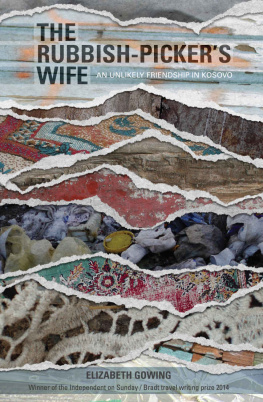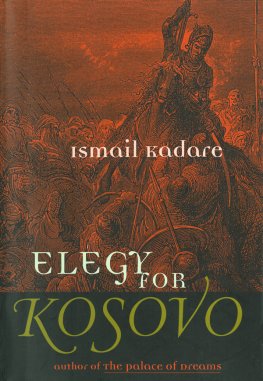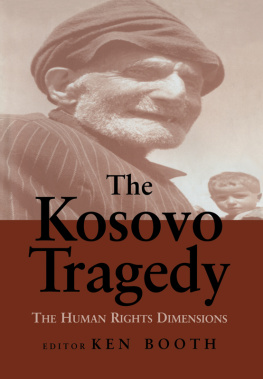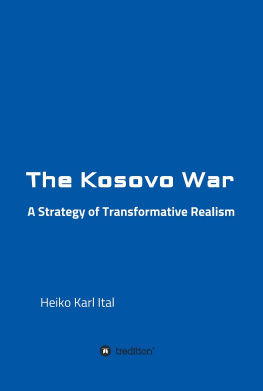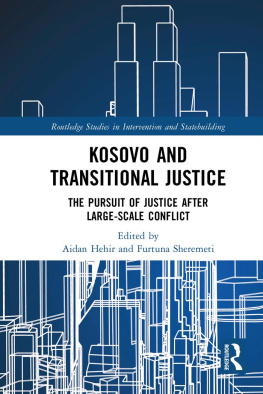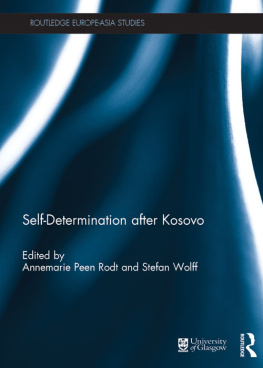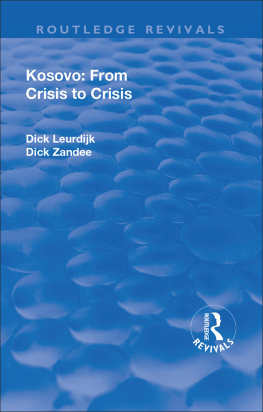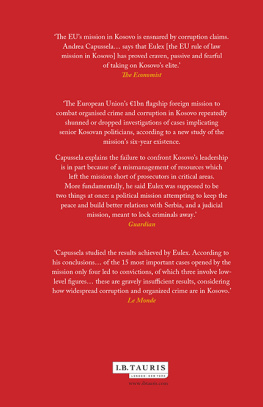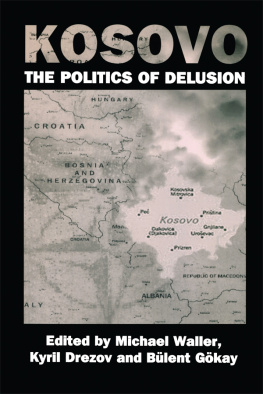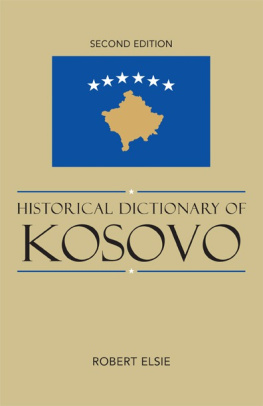Gowing - The rubbish-pickers wife : an unlikely friendship in Kosovo
Here you can read online Gowing - The rubbish-pickers wife : an unlikely friendship in Kosovo full text of the book (entire story) in english for free. Download pdf and epub, get meaning, cover and reviews about this ebook. City: Kosovo (Republic), year: 2015, publisher: Elbow Publishing, genre: Home and family. Description of the work, (preface) as well as reviews are available. Best literature library LitArk.com created for fans of good reading and offers a wide selection of genres:
Romance novel
Science fiction
Adventure
Detective
Science
History
Home and family
Prose
Art
Politics
Computer
Non-fiction
Religion
Business
Children
Humor
Choose a favorite category and find really read worthwhile books. Enjoy immersion in the world of imagination, feel the emotions of the characters or learn something new for yourself, make an fascinating discovery.
- Book:The rubbish-pickers wife : an unlikely friendship in Kosovo
- Author:
- Publisher:Elbow Publishing
- Genre:
- Year:2015
- City:Kosovo (Republic)
- Rating:3 / 5
- Favourites:Add to favourites
- Your mark:
- 60
- 1
- 2
- 3
- 4
- 5
The rubbish-pickers wife : an unlikely friendship in Kosovo: summary, description and annotation
We offer to read an annotation, description, summary or preface (depends on what the author of the book "The rubbish-pickers wife : an unlikely friendship in Kosovo" wrote himself). If you haven't found the necessary information about the book — write in the comments, we will try to find it.
Gowing: author's other books
Who wrote The rubbish-pickers wife : an unlikely friendship in Kosovo? Find out the surname, the name of the author of the book and a list of all author's works by series.
The rubbish-pickers wife : an unlikely friendship in Kosovo — read online for free the complete book (whole text) full work
Below is the text of the book, divided by pages. System saving the place of the last page read, allows you to conveniently read the book "The rubbish-pickers wife : an unlikely friendship in Kosovo" online for free, without having to search again every time where you left off. Put a bookmark, and you can go to the page where you finished reading at any time.
Font size:
Interval:
Bookmark:
THE RUBBISH-PICKERS WIFE
AN UNLIKELY FRIENDSHIP IN KOSOVO
ELIZABETH GOWING
Elbow Publishing
Cornwall
Dedicated to my own and the worlds teachers, meaning not only the committed men and women who work in schools, but also parents, grandparents, volunteers, civil society activists and nine year-old Ashkali girls from whom Ive learned so much.
First published in 2015 by Elbow Publishing
Copyright Elizabeth Gowing, 2015
The right of Elizabeth Gowing to be identified as the author of this work has been asserted by her in accordance with the Copyright, Designs and Patents Act, 1988.
All rights reserved. The whole of this work, including all text and illustrations, is protected by copyright. No part of this work may be loaded, stored, manipulated, reproduced or transmitted in any form or by any means, electronic or mechanical, including photocopying and recording, or by any information, storage and retrieval system without prior written permission from the publisher.
A catalogue record for this book is available from the British Library
ISBN 978-0-9574090-3-3
Cover design by Su Jones and Paddy McEntaggart incorporating photographs taken by children of Neighbourhood 29 in Fush Kosov and used by them with permission. The photographs were taken as part of a summer project with children aged six to sixteen and a larger selection of the work of these talented young photographers can be seen at www.thisisneighbourhood29.com
Inline photographs Elizabeth Gowing, except where others are acknowledged alongside the photograph
Design & typesetting: Sally Ellis
THE RUBBISH-PICKERS WIFE
AN UNLIKELY FRIENDSHIP IN KOSOVO
ELIZABETH GOWING
Contents
This book has failed if it doesnt give a proper picture of the huge and varied team of people who made possible the education of the families of the rubbish-pickers of Fush Kosov and beyond. So many people gave their time, their skills and their money to make the events narrated here happen. I am enormously grateful to the Krasniqi family and to all their neighbours and community for making me feel welcome, but also to all those who have supported me and others of The Ideas Partnership charity in our work there. Chief among them is the man who has bankrolled so many of my untested ideas, who said we could do that with not a seconds hesitation when I suggested working in Fush Kosov, and who wakes me every morning with a cup of green tea and enthusiasm for the day ahead. Thank you, Rob.
The Ideas Partnership is going from strength to strength, and its impact has developed even further from the work narrated here. This is due to the enormous commitment of our staff and volunteers, many but not all of whom are mentioned by name in the book. We have also been lucky to have support from a wide range of private and institutional donors, many of them also friends. Thank you!
Others have helped with the production of this book whether encouraging me to write it (thank you, Louise and Charlie), reading extracts of it in draft (thank you, Chris Gowing, Joanna Jepson, Marie Kreft, Sam Lucas, Rob Wilton, Moira Ashley and the other members of Liz Cleeres Itinerant Writers Club), creating such gorgeous cover art for it (thank you, Su Jones and Paddy McEntaggart and rlagh) and making it look lovely inside (thank you, Sally Ellis) or proofreading (thank you Hannah Brandley, though any errors that remain are my own). I would like to thank the Raphael family for all that they have given throughout the process of its writing, and beyond, in Kosovan levels of hospitality, and support of every kind to me and to our work in Fush Kosov.
In a few places in the text, names have been changed to protect the privacy of individuals, but the events recounted here are true.
The turning away
I had never been this far into Fush Kosov before. Its a suburb Im familiar with: every foreigner who comes to Kosovo passes through it because its the municipality that lies between the airport and Kosovos capital city, Prishtina. Its mainly a strip development: for me Fush Kosov was the Scandinavian furniture store where wed bought lamps and cushions for our new home here, and the supermarket where Id bought canned coconut milk like a burst of exotic sunshine in my wintry Balkan home cooking. But today the taxi drove me past these well-lit stores and I realised we were heading for the train station.
Fush Kosov railway station is grim. Not just because its a brown 1970s whimsy floored with broken tiles and pools of brown liquid, probably though not certainly from the leaking roof. Also because it was to this station that Prishtinas Albanians were herded by Miloevi s Serbian forces in the freezing days of April 1999. In their thousands they were gathered in this station and held for twenty four hours (long enough for a baby to be born, and an old man to die I imagined moans and wailing) while they thought about their history books and the Jews of the 1940s, before being forced onto trains and dispatched to the Macedonian border.
In fact my taxi drove past the station too. This was deep into another part of Fush Kosov, another side to Kosovo. At a corner stood a staring group of young men, dark-skinned. They eyed our car and me, unsmiling. They looked like trouble waiting to happen.
We left the long shadows of Fush Kosovs high-rise strip development, and a new neighbourhood unfolded on one side the railway lines in the colours of oil smears and industrial decay; on the other side shacks and single-storey homes, fenced with old car doors also the colour of rust. Smoke that smelled of shit rose from behind the houses. There were words spray-painted on walls, for sale, lime in stock, pipes and drums for weddings. More young men loitered, blowing on their hands to keep warm.
The community was clustered around an enormous rubbish heap, like old English villages centred their homes round a green and a duckpond. Children shouted, toddled or rummaged the rubbish heap. Some of them were barefoot; some had the swollen bellies of malnutrition. Women whipped into doorways with a whisk of a headscarf. After four years living in Kosovo this country usually seemed familiar to me; here I felt I was in a foreign land, and in another time. A grubby-faced boy came out of an alley bowed low under a sack of metal salvage. It was like being in a dark-faced Dickens novel.
The car pulled up at a community centre Portakabins surrounded by a huddle of children. Some of the kids tried out their English on me as I walked through them with my bulging sacks of clothes. Hello. Ow arry oo? I hate the fact I am so obviously not from this country. I replied in Albanian,
Si je? how are you?
The children were confused, embarrassed; they hid their faces and turned away.
I was here to meet with the head of the Balkan Sunflowers Learning Centre offering homework support for the neighbourhoods schoolchildren. Id heard about his work and it seemed that this was the main force for changing the life-chances of the children in this community. I was here because our charity had run an environmental education camp which had left us with a surplus of sleeping bags, plates, and equipment that might be useful for families in need, and my bags were stuffed with things we wanted to give away. Rrahmon, the head of the Centre, was going to take me to some families he considered most in need, in this community where need was a default.
His office was crowded with two desks and a scramble of chairs. I inched round the sharp edges with my plump bag of donations and found a place to sit. He greeted me with the elaborate welcome Ive got used to in Kosovo, asking after my health, my family, my work, and sitting me down and offering tea. But his attention wasnt all on me even as he welcomed me the door was opening and pixie-faced children were coming in with questions or requests. Some wanted to borrow books from the centres library sitting on a few shelves above Rrahmons desk, and they carried in carefully battered school primers or books of cartoons on cheap paper, and Rrahmon wrote down their names and details in a ledger and they chose another book to carry out just as carefully. Members of staff interrupted us too with queries, problems, timetabling concerns. These were familiar rhythms to me, and more than I had since arriving in Kosovo I felt nostalgic for the little primary school in Hackney where Id worked as a deputy head.
Font size:
Interval:
Bookmark:
Similar books «The rubbish-pickers wife : an unlikely friendship in Kosovo»
Look at similar books to The rubbish-pickers wife : an unlikely friendship in Kosovo. We have selected literature similar in name and meaning in the hope of providing readers with more options to find new, interesting, not yet read works.
Discussion, reviews of the book The rubbish-pickers wife : an unlikely friendship in Kosovo and just readers' own opinions. Leave your comments, write what you think about the work, its meaning or the main characters. Specify what exactly you liked and what you didn't like, and why you think so.

